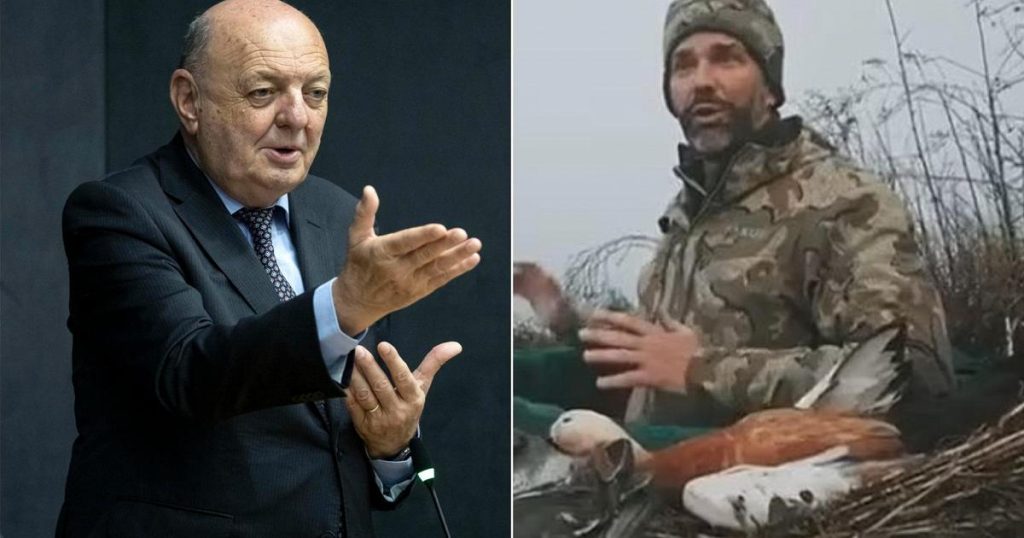Environmental Minister Addresses Trump Jr. Hunting Controversy in Italy
The Italian Minister of the Environment and Energy Safety, Gilberto Pichetto, has been questioned regarding a controversial video allegedly showing Donald Trump Jr., the son of the former U.S. President, hunting protected species in the Venice Lagoon, a protected area in Italy. The video, which surfaced on a U.S.-based specialized website, has sparked significant concern and outrage among environmentalists and lawmakers. The case has prompted a parliamentary question from the Europe Verde party and a formal complaint filed with the Prosecutor’s Office. Minister Pichetto emphasized that his role as a government official requires him to approach the matter with caution, stating, "Maybe it’s a double. I have no element to express a position. I have to express it as a government, not as a citizen. And therefore, as a government, when I have the elements, I will respond in the classroom to what are the requests."
The Minister’s Cautious Response to the Allegations
When asked directly if the situation involving Trump Jr. would be considered serious, Pichetto refrained from making definitive statements, citing the lack of concrete evidence. He said, "I do not express that it is serious because I do not have the elements. It may be that the offices already have something because it seems to me that there is a question." The Minister’s response reflects the careful balance required in such situations, where speculation could lead to unnecessary diplomacy issues or legal complications. Pichetto also highlighted that his role is to wait for the appropriate channels to provide the necessary information before making any official statements.
Legal and Regulatory Questions Surrounding the Case
The case has raised questions about whether foreign nationals, including high-profile individuals like Trump Jr., can hunt in Italy without proper permits. Italian law strictly regulates hunting activities, especially in protected areas like the Venice Lagoon, which is a UNESCO World Heritage Site and a critical habitat for numerous wildlife species. If the allegations are true, Trump Jr. would be in violation of Italy’s environmental and hunting laws, which require foreigners to obtain special permits to hunt in the country. The Minister’s reluctance to comment directly on the matter underscores the need for thorough investigations to ensure that all legal protocols are followed.
Political and Diplomatic Implications of the Controversy
The controversy has also sparked a broader debate about the enforcement of environmental laws in Italy and the treatment of foreign nationals, particularly those with high political profiles. The Europe Verde party and other opposition groups have been vocal in demanding accountability, filing parliamentary questions and raising concerns about potential preferential treatment for Trump Jr. The case has also highlighted the delicate balance between diplomacy and the rule of law, as Italy seeks to maintain good relations with the United States while upholding its environmental regulations.
The Role of the Prosecutor’s Office and Parliamentary Inquiries
The Prosecutor’s Office is currently investigating the allegations, and the Minister has stated that he is awaiting the outcome of these inquiries before responding further. In the meantime, parliamentary questions from the Europe Verde party and other groups are putting pressure on the government to provide clarity on the matter. The Minister’s office has also been focused on addressing other high-profile cases, such as the Almasri case, which has further complicated the political landscape. Pichetto’s commitment to following legal procedures reflects the importance of ensuring that all cases are handled with transparency and fairness.
Conclusion: A Call for Accountability and Transparency
The controversy surrounding Donald Trump Jr.’s alleged hunting activities in the Venice Lagoon has brought to light important questions about environmental protection, legal enforcement, and the role of government officials in addressing such sensitive issues. Minister Pichetto’s cautious approach, while understandable, has also prompted calls for greater accountability and transparency from the government. As the investigation unfolds, it remains to be seen how the Italian authorities will handle the case and whether the allegations will result in any formal charges or penalties. The outcome of this case will not only impact Italy’s environmental policies but also set a precedent for how similar incidents involving foreign nationals are addressed in the future.












